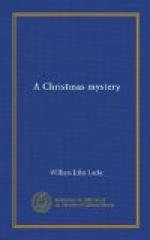“Drunk?” asked Biggleswade.
Doyne felt the man and laid his hand on his heart.
“No,” said he, “dead.”
McCurdie leaped to his full height. “I told you the place was uncanny!” he cried. “It’s fey.” Then he hammered wildly at the door.
There was no response. He hammered again till it rattled. This time a faint prolonged sound like the wailing of a strange sea-creature was heard from within the house. McCurdie turned round, his teeth chattering.
“Did ye hear that, Doyne?”
[Illustration: I told you the place was uncanny.]
“Perhaps it’s a dog,” said the Professor.
Lord Doyne, the man of action, pushed them aside and tried the door-handle. It yielded, the door stood open, and the gust of cold wind entering the house extinguished the candle within. They entered and found themselves in a miserable stone-paved kitchen, furnished with poverty-stricken meagreness—a wooden chair or two, a dirty table, some broken crockery, old cooking utensils, a fly-blown missionary society almanac, and a fireless grate. Doyne set the lamp on the table.
“We must bring him in,” said he.
They returned to the threshold, and as they were bending over to grip the dead man the same sound filled the air, but this time louder, more intense, a cry of great agony. The sweat dripped from McCurdie’s forehead. They lifted the dead man and brought him into the room, and after laying him on a dirty strip of carpet they did their best to straighten the stiff limbs. Biggleswade put on the table a bundle which he had picked up outside. It contained some poor provisions—a loaf, a piece of fat bacon, and a paper of tea. As far as they could guess (and as they learned later they guessed rightly) the man was the master of the house, who, coming home blind drunk from some distant inn, had fallen at his own threshold and got frozen to death. As they could not unclasp his fingers from the broken bottleneck they had to let him clutch it as a dead warrior clutches the hilt of his broken sword.
Then suddenly the whole place was rent with another and yet another long, soul-piercing moan of anguish.
“There’s a second room,” said Doyne, pointing to a door. “The sound comes from there.” He opened the door, peeped in, and then, returning for the lamp, disappeared, leaving McCurdie and Biggleswade in the pitch darkness, with the dead man on the floor.
“For heaven’s sake, give me a drop of whiskey,” said the Professor, “or I shall faint.”
Presently the door opened and Lord Doyne appeared in the shaft of light. He beckoned to his companions.
“It is a woman in childbirth,” he said in his even, tired voice. “We must aid her. She appears unconscious. Does either of you know anything about such things?”
They shook their heads, and the three looked at each other in dismay. Masters of knowledge that had won them world-wide fame and honour, they stood helpless, abashed before this, the commonest phenomenon of nature.




